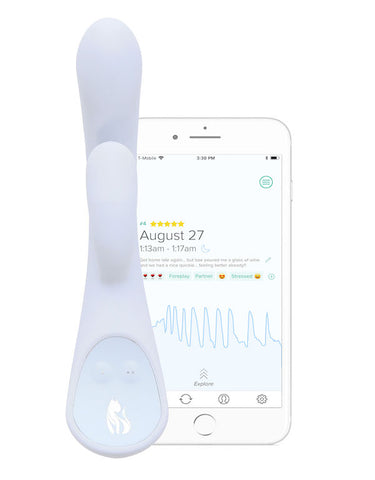
By: Lindsay Curtis
The married life was not what newlywed Annette B. had envisioned. Her husband was doting, helpful, kind and attractive. Sharing a life with him as newlyweds was everything she dreamed of, except—they weren’t having sex.
Shortly after they were married, Annette lost her desire to have sex. “I tried to feign interest for a while, but that felt dishonest,” she describes. “It was like one day I wanted sex all the time, and then one day I just…didn’t.I didn’t eventhinkabout sex.”
While she and her new husband had sex sporadically, for the first time in her life she felt like she was just going through the motions. “It wasn’t just the sex,” Annette says. “I lost the desire to even flirt, or send him sexy texts while he was at work. That part of my life seemed to vanish.”
Talking with friends didn’t make her feel any better. They all told her that if she wasn’t interested in sex as a newlywed, it was bad news for their relationship.
Eventually, Annette visited her doctor, where she learned she had a hormonal imbalance. “I was so embarrassed to even say it out loud to my doc, but I’m so relieved I did. The medication I took completely changed everything, and I’m happy to say our sex life is back to normal.”
Annette’s story isn’t unique.Studies show that nearly 40% of women will experience some type of sexual problem over the course of their lives. And low libido doesn’t just affect our sex lives. Research in theJournal of Sexual Desire found that 70% of women with low desire experience negative effects on their body image, self-confidence, and connection to their partner.
Your sex life is a vital part of your health and well-being, so don’t be shy about making it a priority.“Women need to know there is hope,” says gynecologist Dr. Steven Rabin. “Your sexual drive can get better. It may take some work, but it is worth the effort to examine the issue, find an expert you’re comfortable speaking with, and doing testing, if needed.”
Four Reasons Why Your Libido and Desire for Sex May Have Decreased
1. Hormonal imbalance

Our hormones are powerful, and even a small shift in hormone levels can cause big changes within the body and may lead to a decrease in libido.
“A woman's libido depends on many factors that are all interrelated,” explainsDr. Kris Sargent, author ofSimply Functional Medicine. “The foundation of our health is based on what we eat and drink, how we move, sleep, think and feel. When any one of these is out of balance, it can lead to hormonal imbalance affect our libido.”
Your doctor may do a physical exam and run blood tests to determine if hormonal imbalance is responsible for your low libido. “I assess and supplement hormones like estrogen and testosterone,” Dr. Rabin explains. “There are prescriptions that can help restore hormonal balance and help bring back the spark.”
2. Stress

If you’re stressed about work, finances, family issues, or your relationship, chances are it’s going to have an effect on your sex drive.
“Stress can definitely lower your libido,” says Nicole Buratti, women’s health coach and owner ofBend & Blossom. “If you don't address the daily stress you're facing, even things that are unrelated to sex like a looming deadline or no time to relax, your libido will suffer.”
Self-care can help manage your stress, so try to carve out time to relax and have fun, and let yourself find pleasure in the simple things in life. “Our emotional health cannot be overlooked, and stress management techniques are so important,” advises Dr. Sargent. “Control what you can: eat healthy, exercise, and get enough sleep.”
If past trauma or psychological issues such as depression or chronic stress are responsible for your stress, therapy may help. Talk with a counselor who specializes in sexual health.
3. Lack of sleep

Ask any tired parent: lack of sleep can have an impact on your sex life. The more sleep you get, the higher your levels of sexual desire. A study published in theJournal of Sexual Medicine found that just one more hour of sleep at night was linked to a 14% increase in the odds that a woman would have sex with a partner the following day. That’s reason alone to try and get some quality shut-eye.
“Women’s bodies need a minimum of six hours of sleep a night in order to produce normal hormone levels,” Dr. Sargent explains. “Good sleep habits — including winding down before bed without screens — are important for sexual health.”
4. Relationship woes got you(r libido) down

For many women, emotional closeness in a relationship is important for sexual intimacy. So problems within your relationship can make it challenging to get into the mood. If you and your partner have fallen into a rut in or out of the bedroom, set aside time to do things that you did when you were first dating. “Lack of communication or unresolved conflicts can add to a low sex drive,” says Dr. Rabin. “Consider taking a weekend away to reconnect and rekindle your connection.” Feeling bored with the same ‘ol, same ‘ol in the bedroom? Try adding sex toys to your repertoire to spice things up, too.
===
Track your libido and arousal withLioness, the world's smartest vibrator.
 Using precision sensors and biofeedback, Lioness not only lets you literally see your arousal and orgasm, it will also help you keep track of what works and doesn't work for you.
Using precision sensors and biofeedback, Lioness not only lets you literally see your arousal and orgasm, it will also help you keep track of what works and doesn't work for you.
Experiment, understand yourself, and have better orgasms — after all, as the saying goes, “never measured, never improved.”
Click hereto learn more.


